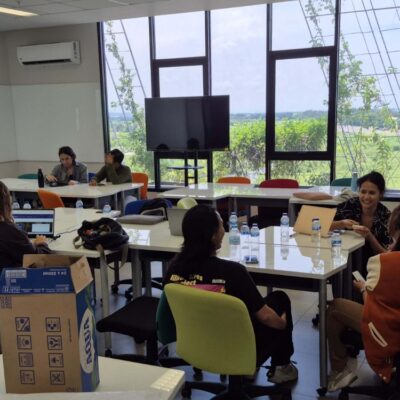Australia’s political leaders struggle to look beyond the tyranny of the urgent to manage the longer term issues. But some visionary leadership is needed. Great power contestation is in full swing and likely will present flash points, while regional governance challenges and environmental concerns will compete for attention. War is not likely, at least not yet; and talk of a Cold War is overly binary and reductionist. But a three-way overlap is at work including great power contestation, environmental challenges and governance crises, like we have seen in Solomon Islands in late 2021. The combination calls for a clear-eyed management of concurrent demands for cooperation, compromise, collaboration, competition, contestation, coercion and conflict. AUKUS and the Quad security arrangements have their place, but Australia must also address felt needs of neighbouring states and of those marginalised and angry. A grand compact with Pacific Island states and a regional maritime cooperation forum could help.
As great power contestation has increased, the unipolar moment has elapsed—a phenomenon accelerated by a US transactional retreat from ideational leadership under former President Donald Trump. Looking for answers, pundits have scrambled for historical parallels and have clutched at metaphors of the Cold War and the appeasement at Munich on the eve of the Second World War. Others hark back to the ancient Greeks for a parallel to the so-called Thucydides Trap, in which where ‘one great power threatens to displace another, war is almost always the result’. These tropes have limited utility for the faster-paced, inter-dependent, web-connected, digitally-transformed and environmentally-strained 2020s. With the world undergoing the fourth industrial revolution, robotics, machine learning, 5G networks, autonomous vehicles, genomics, quantum computing and the ‘internet of things’ make most such metaphors of limited utility. Today we face layer upon layer of interconnected challenges and opportunities—including along economic, diplomatic, military and climate lines. No one metaphor adequately captures the overlapping and inter-related factors. What does remain pertinent, though, is the enduring overlap of factors leading to conflict which Thucydides identified more than two millennia ago—fear, honour and interest
Events in 2020 and 2021 saw fear surge with an unprecedented pandemic-related disruption, along with heightened competing interests and sense of honour in great power contestation. Along the way, US President Joe Biden has sought to burnish American prestige declaring the United States ‘is back’. Many remain sceptical and worried about a waning US enthusiasm and ability to remain engaged, particularly in light of China’s exercise of ‘wolf warrior’ diplomacy and its use of ‘sharp power’ sanctions. In addition, China’s adversarial actions in the East China Sea, the South China Sea and across the Line of Actual Control in the Himalayas point to their own insecurities and fears, as well as their own sense of honour.
This sense of honour is seen as reflecting the desire to ‘never again’ allow China to be subjected to circumstances of collective trauma associated with the ‘century of humiliation’. Conversely, India’s honour is at stake over the challenges in the Himalayas, as is Japan’s over the Senkaku/Diaoyu Islands. For the United States, much of its prestige and sense of honour is on the line as its dominant role in the so-called rules based global order is being challenged.
China’s assertiveness has also driven a more focused multilateral response. This is notably with the quadrilateral security dialogue between India, Japan Australia and the United States (otherwise known as the Quad), and the trilateral security arrangement between Australia, the United Kingdom and the United States (known as AUKUS).
Neither of these multilateral arrangements would have emerged without a growing unease over Chinese assertive authoritarian behaviour coupled with its exponential increase in military power that was on display at the 2019 military parade. When initially touted in 2007, the Quad was quite easily derailed by Chinese protestation. Australia gave priority to allaying their fears and showing due deference. But the reinvigoration of the Quad in recent times would not have been possible without China’s assertiveness, particularly under President Xi. The member states now see their interests more closely aligned. As a result, the Quad is being consolidated despite the pandemic, if not in part because of it. What started as a maritime security dialogue quickly expanded to include collaboration on vaccine rollouts, advanced technology and rare-earths management. The competition and overlapping interests has invigorated the ties and catapulted the emerging opportunities.
In a similar way, the surprise emergence of AUKUS reflects technological and political factors—and the alignment of interests. First, Brexit drove the UK to find new ways to validate the US ‘special relationship. Engaging in the Indo-Pacific helps burnish its US alliance credentials, while also enabling exploration of trade deals and export opportunities to compensate for its EU departure. The prospect of additional UK jobs relating to submarine construction also would be weighing on the mind of British Prime Minister Boris Johnson.
For the United States, given its relative military decline, bolstering the military capability of longstanding ally Australia seems to make sense. Tying in Australia more closely to US plans and encouraging greater spending on inter-operable US technology can be seen as adding to the stockpile in case of a major confrontation with China. But it also reveals a greater sense of vulnerability in light of China’s rapid rise.
For Australia, China’s list of ‘14 grievances’ are now seen as being too great, effectively being a mark of dishonour, generating a backlash. At the same time, greater US and UK engagement in the defence of Australia reduces some of the fear of abandonment by ‘great and powerful friends’ while also, ironically enough, bolstering a fear of entrapment, that conceivably could see Australia drawn into a conflict in Asia not of its own making—notably potentially over Taiwan.
Technically, AUKUS looks set to bolster Australia’s ability to produce and maintain a supply of precision and long range missile systems—widely seen as a key missing ingredient in the Australian defence force’s ability to generate a deterrence effect. In addition, the proliferation of more, and more sophisticated, air and space surveillance platforms has significantly eroded the degree of stealth of diesel-electric propulsion submarines—especially over longer distances, where they are required to surface to recharge batteries, exposed to detection by would-be adversaries.
Australia’s approach to AUKUS has been criticised as a return to the past. Indeed, it points to the ongoing dialectic at work, attempting to reconcile Australia’s geography (as an Indo-Pacific middle power) with its history (as a member of the Anglosphere). This clash has been most acutely noticeable in the reactions of neighbouring member states of the Association of Southeast Asian Nations (ASEAN). Some are unsettled by Australia’s prioritising UK and US ties over those with their neighbours. While some have been supportive, Malaysia and Indonesia have expressed unease. But many are mostly uneasy with the notion of ASEAN centrality being challenged. Yet ASEAN centrality is threatened in the face of great power contestation, not just by AUKUS. Notably ASEAN has been struggling to act coherently and to speak with one voice. Some member states defer to China on how to respond or engage. In addition, within each state, voices vary between government and industry and between diplomats and defence practitioners.
Of all the ASEAN states, Australia’s relationship with Indonesia is perhaps the most important, yet it has been a bit like the board game ‘Snakes and Ladders’. Australia’s track record of acting respectfully, honouring Indonesian sensibilities, is patchy. Incremental progress in the relationship (up the ladder) is easily undone (down the snake) over a range of misunderstandings and slights, including over issues such as Jerusalem, beef, boats, spies, clemency, Timor Leste and Papua. Both countries have considerable overlapping interests. They both have to find a way to deepen and broaden the bilateral relationship to prevent this cycle from continuing to recur. In considering how to do that, understanding how they got here is important. Bilateral and multilateral engagement, on trade, education, and security including through Indonesia Australia-Comprehensive Economic Partnership Agreement, links like the Ikahan (defence alumni) network, and additional New Colombo Plan engagement may help make that happen. Beyond these bilateral ties, regional mechanisms are important. MANIS is the Indonesian word for sweet. Australia should look to work with Indonesia to make it an acronym for a ‘sweet’ regional maritime cooperation forum including Malaysia, Australia, New Zealand, Indonesia and Singapore. Potentially it could be expanded to MANIS-TPP (by including Timor Leste, Papua New Guinea and the Philippines). This wouldn’t replace ASEAN but it might help these maritime Southeast Asian nations work through some regional challenges together.
In the meantime, while nuclear propulsion has consumed much of the policy space in Canberra, pressing environmental and regional governance challenges loom. The recent violence in the streets of Honiara, the capital of Solomon Islands, points to a range of factors unsettling domestic politics including concerns over corruption, the influence of Taiwan-China rivalry and competing interests more than environmental concerns. But elsewhere in the Pacific, Australia’s sharp-edged domestic debates over climate policy reverberate. There is a sense that Australia is not being sufficiently respectful of Pacific Island environmental sensibilities—leaving an honour deficit.
Australia’s Prime Minister Scott Morrison won incomplete support from his National Party coalition partners on his way to Glasgow for UN Climate Change Conference COP26. But that deal found detractors aplenty both domestically and internationally. COP26 showed how others are taking an adversarial stance towards Australia such that potentially diminishes Australia’s influence in regional and global fora. A fresh approach is required to avoid being outplayed.
Shifting political dynamics, with a changed mood of electorates both domestically and abroad, calls for active measures to limit the effects of global climate change.
Morrison’s Christian faith, helps carry his message to ‘vuvale’ or family in neighbouring states. This honouring of Pacific religious sensibilities capitalises on strongly felt views in many Pacific Islands. Yet that faith is one of not just words but deeds. Although Australia is considered an increasingly secular and cosmopolitan, or post-Christian society, it is still heavily influenced by its Judaeo-Christian roots. Morrison’s faith should energise efforts to set about being the instrument to answer the prayers many have offered for change to happen.
Yet to an extent these initiatives are being undermined by the perception of Australia as being an environmental laggard. This is being used by detractors amongst Pacific neighbours effectively to castigate and damage the image and reputation of Australia. Despite the evident hypocrisy and double standards involved, Chinese authorities have jumped on this bandwagon to criticise Australia as well, and to curry favour and exploit opportunities to expand China’s influence in the region. While investment offers are broadly welcomed, if subject to appropriate scrutiny and caveats, security pundits see some of these efforts as opportunistic and largely inimical to Australia’s interests.
The Pacific Islands Forum itself has been strained by rival visions and competing influence. The departure of Kiribati from the Forum coincides with its acceptance of Chinese investment deals and an evident decline in Australian influence on developments there.
The strained relations with Kiribati have been matched by competing power plays in Tonga. The Australian and New Zealand response to the Tongan volcanic eruption, no doubt, will be seen in part as a response to fears of Chinese interference there. The more recent security crisis in Solomon Islands points to the challenge of contestation, with governance concerns in a weak state affected by a range of environmental challenges. So what is to be done?
The Australian Security Leaders Climate Group (ASLCG) published a report entitled Missing in Action: Responding to Australia’s climate & security failure. The report highlights what we already know: the record-breaking droughts, floods, heatwaves and bushfires, all combine to foster instability and insecurity. This is fertile ground for corruption, terrorism, transnational crime and a breakdown in law and order.
Amongst Australia’s neighbouring states in the Pacific and elsewhere, there remain a range of exploitable concerns upon which a potential adversary could seek to capitalise. Not everybody feels the same about this, admittedly. Some stress motives for action being fear over great power contestation, others stress abiding interests, while others stress the need to honour commitments already made. But sceptics of activist climate-related measures should at least see the utility of this approach for no other reason than to pursue Australia’s interests and to ensure Australia’s influence remains strong in the Pacific and Southeast Asia.
In addition, there is a need for US-Canberra talks to focus not just on China but on climate disruption. Australian policymakers should see it as being in the national interest to see climate as a national security threat in alignment with the views of our Pacific family. Australian policymakers must undertake a thorough climate security risk assessment covering Australia, the Pacific and beyond.
One way to address the felt needs of Pacific island communities while addressing some of Australia’s concerns would be to offer a grand compact to the small Pacific nations. Such a compact would give the islanders citizenship in return for partnerships covering management and policing of their vulnerable exclusive economic zones and territories. Australia’s ‘compacts of association’ could be with countries such as Kiribati (population 115,000), Tonga (107,000), Tuvalu (11,000) and Nauru (11,000). Such an arrangement could be akin to the relationship the United States has with Palau, the Marshall Islands and Micronesia, and New Zealand has with Niue and the Cook Islands.
That means Australia would offer residency rights and potentially citizenship to just over 244,000 people and help administer and guarantee sovereignty to a cumulative exclusive economic zone of over 5.118 million square kilometres. Australia would gain economically and politically from bolstering security and stability in the region, while also helping to limit the prospect of destabilising external interference.
Critics have suggested this is too neo-colonialist, but such views caricaturise the notion of a compact of association which has worked well with New Zealand Niue and the Cook Islands and which is intended to ensure mutual benefit, not one-sided exploitation. To be sure, for the scheme to work, it must be about honour, dignity and mutual interests and benefits to avoid it being seen as ‘a neo-colonial land grab’. The proposal would be to offer a compact that is substantive, respectful, inclusive and voluntary.
Former Australian Prime Minister Kevin Rudd suggested something similar recently, calling for a ‘formal constitutional condominium’ similar to the arrangement with Norfolk Island. He also prepared a Cabinet paper on the idea in 2012. His call was not well received, with Tuvalu’s prime minister accusing him of ‘imperial thinking’. Anote Tong, Kiribati’s former president, told the ABC in February 2020 that a grand compact of association would be difficult for small island countries to turn down. Indeed, closer relationships would bring enormous benefits to the Pacific nations, helping them monitor their seas, which were being exploited dramatically by foreign fishing and sea bed exploration.
The islanders have had a cultural predisposition to work with Australia and most likely would be comfortable with a trusting, two-way relationship with Australia. They likely would warmly embrace the idea if Australia was big-hearted enough to meet their needs on the environment and climate change, and if it changed its attitude of flittering between haughty and disengaged. For this to work it would have to be done very much with a ‘please consider’ mindset, not a ‘here’s what you need to do’ one.
If Pacific Islanders want this they can quietly approach their high commissioners and express their interest.
A similar but less all-encompassing arrangement also should be considered for the larger Pacific states, including Vanuatu (population 270,000), Solomon Islands (600,000) and Fiji (898,000). To begin with this could involve additional assistance in patrolling their seas and in the provision of residency rights in Australia.
Australians should look beyond seeing the Australian Defence Force (ADF) as the panacea for crises and should be mindful it is a much smaller force than most realise—a boutique defence force, really. Australia understandably is looking to bolster the resources of the ADF, but this must not be as a zero-sum alternative to better resourcing for state-based police, fire, para-medical and emergency services, let alone foreign aid, development and diplomacy. We should be looking holistically at the full spectrum of challenges we face as a nation, considering their implications with an inter-generational time-frame in mind. That means acknowledging not just the importance of responding to great power contestation and governance challenges, but the pressing felt needs of climate change as well. Only then will we avoid being outplayed.
For this scheme to work, the Australian federal government will need to take a more visionary and less transactional approach to engagement with the neighbours. It must take felt needs into account, it must honour commitments and act honourably, respecting local sensibilities.
The combination of great power contestation, coupled with a range of governance and environmental challenges points to the need for visionary and level-headed management of complex and competing challenges. The offer of a grand compact, addresses interests and fears. If presented honourably, it may work. Similarly, we should reflect on the significance of reconciling our history and our geography, our sense of Western identity with our place in the middle of the Indo-Pacific. That reflection should steer us towards capitalising on AUKUS ties as well as Quad arrangements while also not forgetting to engage respectfully and with honour our Southeast Asian and South Pacific neighbours, bilaterally and multilaterally. That should include a recognition that fear, honour and interest remain enduring drivers in international affairs.
Author: John Blaxland is professor of International security and Intelligence studies at the Strategic and Defence Studies Centre at the Australian National University. He is a member of the Australian Security Leaders Climate Group and of the ANU’s Institute for Climate, Emergency and Disaster Solutions.
Image: Palmyra Atoll. Credit: USFWS-Pacific Region/Flickr. This image has been cropped.




